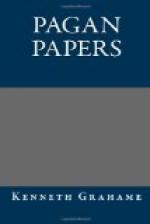Yes: to-day the iron horse has searched the country through — east and west, north and south — bringing with it Commercialism, whose god is Jerry, and who studs the hills with stucco and garrotes the streams with the girder. Bringing, too, into every nook and corner fashion and chatter, the tailor-made gown and the eyeglass. Happily a great part is still spared — how great these others fortunately do not know — in which the rural Pan and his following may hide their heads for yet a little longer, until the growing tyranny has invaded the last common, spinney, and sheep-down, and driven the kindly god, the well-wisher to man — whither?
Marginalia
American Hunt, in his suggestive ``Talks about Art,’’ demands that the child shall be encouraged — or rather permitted, for the natural child needs little encouragement — to draw when- and whereon-soever he can; for, says he, the child’s scribbling on the margin of his school-books is really worth more to him than all he gets out of them, and indeed, ``to him the margin is the best part of all books, and he finds in it the soothing influence of a clear sky in a landscape.’’ Doubtless Sir Benjamin Backbite, though his was not an artist soul, had some dim feeling of this mighty truth when he spoke of that new quarto of his, in which ``a neat rivulet of text shall meander through a meadow of margin’’: boldly granting the margin to be of superior importance to the print. This metaphor is pleasantly expanded in Burton’s ``Bookhunter’’: wherein you read of certain folios with ``their majestic stream of central print overflowing into rivulets of marginal notes, sedgy with citations.’’ But the good Doctor leaves the main stream for a backwater of error in inferring that the chief use of margins is to be a parading-ground for notes and citations. As if they had not absolute value in themselves, nor served a finer end! In truth, Hunt’s child was vastly the wiser man.




